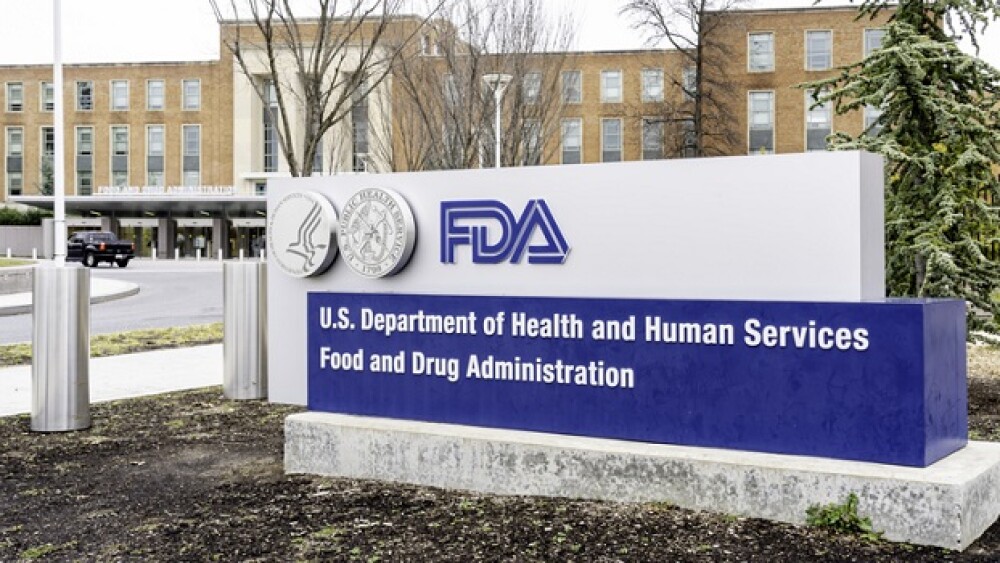The study participant who died was apparently ineligible for the treatment according to the trial protocol, Arcellx announced Monday. The company has since retrained the study’s clinical sites.
Pictured: FDA sign/Courtesy, iStock
Arcellx’s iMMagine-1 Phase II clinical program is back on track as the FDA has given the company the greenlight to continue testing its CART-ddBCMA treatment in patients with relapsed or refractory multiple myeloma following a partial clinical hold, the company announced Monday.
The trial, being conducted in partnership with Gilead’s Kite Pharma, was paused in June following the death of a participant who received the investigational cell therapy. Arcellx stated that this particular patient was actually ineligible for the treatment under the trial protocol and was subsequently managed in a way that conflicted with that protocol. The company has retrained the clinical sites involved in the study and made further adjustments to prevent such lapses from reoccurring.
“We have worked closely with FDA to expeditiously resolve the clinical hold and we thank them for their collaboration and dialogue throughout this process,” Arcellx CEO Rami Elghandour said in the press release. “We and our partners at Kite remain confident in CART-ddBCMA’s potential as a best-in-class therapy for the treatment of patients with RRMM given the totality of data to date across our studies.”
The company expects preliminary data from the trial in the second half of 2024.
Original story posted June 20:
FDA Hold on Arcellx’s Multiple Myeloma Cell Therapy Trial After Patient Death
Following the death of a patient, the FDA has placed a clinical hold on Arcellx’s iMMagine-1 Phase II trial of its T cell therapy for relapsed or refractory multiple myeloma. The company’s stock fell around 23% in pre-market trading Tuesday.
Arcellx contends that “limitations” on the bridging therapy “are a contributing factor” and is working with the agency to amend the protocol and expand patient options, according to Monday’s press release. The FDA gave the go-ahead to dose the patients who have already undergone lymphodepletion in the trial, the company said.
The bridging therapy is initiated to keep patients’ cancer from worsening once their T cells have been collected during the chimeric antigen receptor (CAR) T manufacturing process. The process is important as the time from apheresis to CAR T cell delivery in past clinical trials has ranged from just over two weeks to three months. In clinical trials, 1% to 4% of patients died from disease progression before therapy.
“The expansion of bridging therapy regimens is consistent with what’s currently available in clinical practice and is in the best interest of patients,” Arcellx CEO Rami Elghandour said in a statement.
Per the Clinical Trial listing, bridging therapy is allowed in the Phase II trial to control disease growth “if necessary” while CART-ddBCMA is manufactured.
Arcellx’s CART-ddBCMA cell therapy is being co-developed by Kite Pharma, a Gilead company, under a $225 million deal announced last December. The investigational cell therapy utilizes the former’s novel BCMA-targeted binding domain.
The deal put Gilead in contention with rival Johnson & Johnson and Bristol Myers Squibb’s partnered CAR T therapies already on the market for relapsed or refractory multiple myeloma. Both J&J’s Carvykti and BMS’ Abecma are approved as fifth-line treatments for RRMM.
After a Phase I trial of the asset produced responses in 100% of the first 12 evaluable patients, Arcellx listed on the NASDAQ in 2022 with a $123.8 million initial public offering.
Last week, 2seventy bio’s Phase I trial was paused by its partner, Seattle Children’s, after a child with acute myeloid leukemia died after receiving the second dose level of the company’s CAR T cell therapy. 2seventy was BMS’ partner in the development of Abecma.
Kate Goodwin is a freelance life science writer based in Des Moines, Iowa. She can be reached at kate.goodwin@biospace.com and on LinkedIn.






